Media Kit
Contents:
- Author bio
- Photos
- Book Covers
- Sample Interview Qs & As
- Sample of newest release, “Black Blizzard”
- Testimonials
- Promo Images (3D)
- Other Media
- Contact author for additional info
1. Author Bio:
GK Jurrens writes with undiluted passion. Click here for a short 30-second welcome video (recorded when we still had a home that wasn’t on wheels).
Gene also teaches writing and publishing on the road. He and his wife live and travel in a motorhome full-time wandering their beloved North America.
After studying Liberal Arts, GK earned a Bachelor of Science degree in Business and a Master of Science degree in Management of Technology from the University of Minnesota, USA. He is the proud father of two adult children and the equally proud grandfather of three adult grandchildren.
Six years of government service and a successful three-decade career in global high-technology preceded more than a few years of sailing America’s waterways, the Florida Keys, and the Eastern Caribbean from the British Virgin Islands to near the coasts of Venezuela and Trinidad, with a brief foray sailing around the Greek Cyclades Islands in the Aegean Sea and the San Juan Islands of America’s Pacific Northwest.
GK now pursues his life-long penchant for the creative arts: prose and poetry, painting (watercolor), traveling (now mostly within North America), playing guitar and his growing collection of Native American flutes, some of which he crafted while living in his bus in the Arizona desert.
He enjoys early morning writing, quiet evenings reading and exploring movies, when not sitting by a campfire alongside his copilot and soulmate of over half a century—Admiral Kay.
2. Photos:

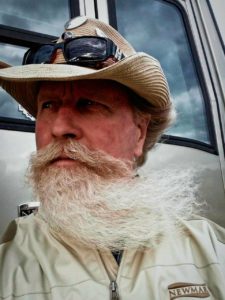


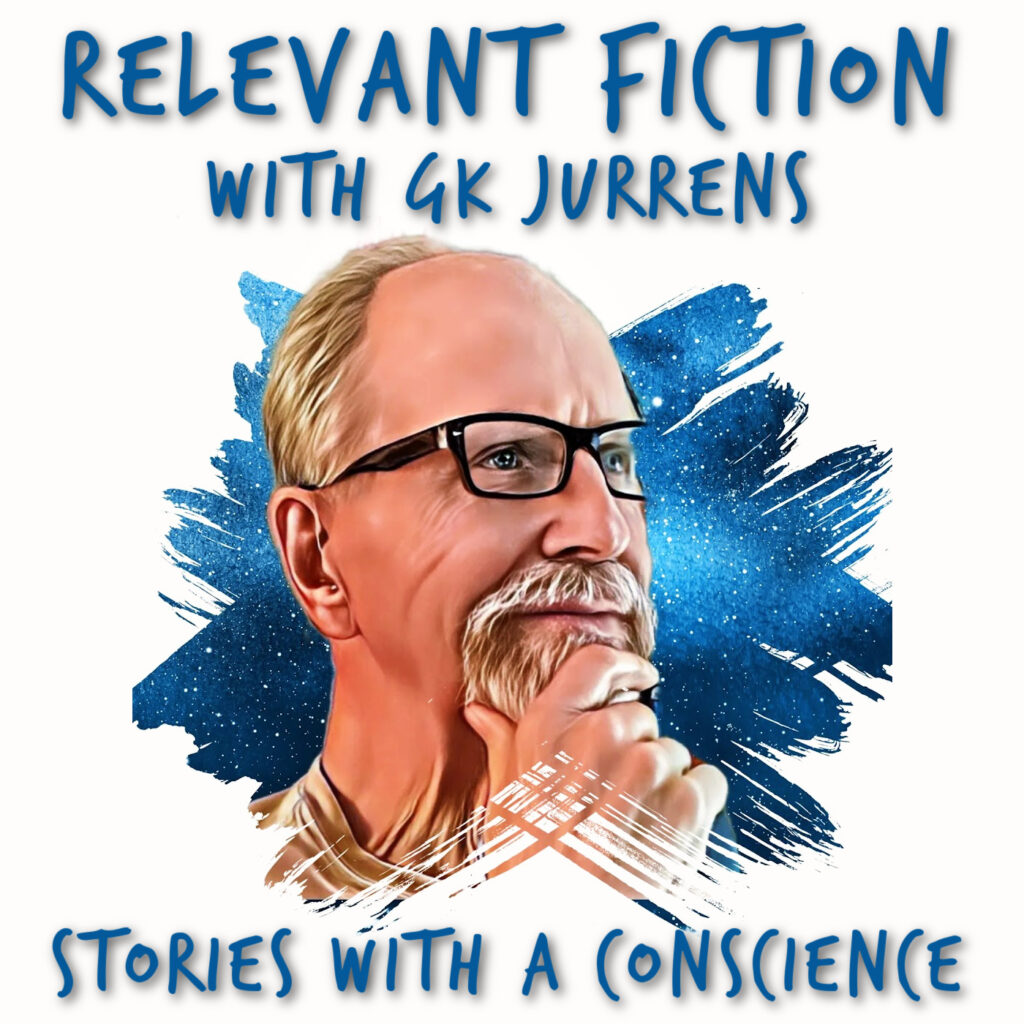
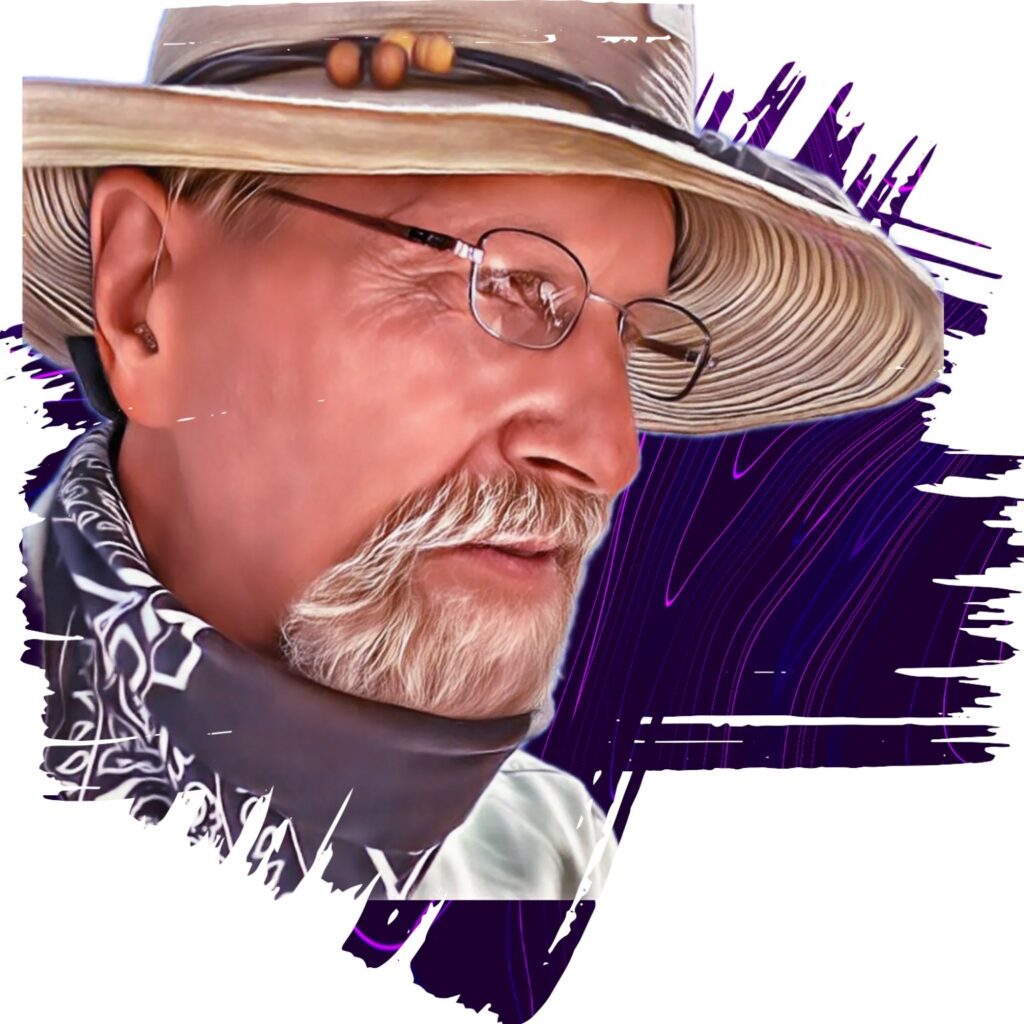
3. Book Covers:
(low res for print or web)

Is a mysterious “entity” murdering Chicago’s most wealthy citizens in a brutal and devious fashion? Do cunning psychic twin sisters hold the key?
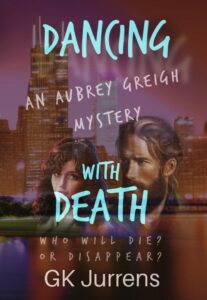
Someone is murdering Windy City Productions movie stars. But a larger story launches from Denmark before carving its bloody path into the American Midwest.

(locked-room whodunnit murder mystery)
Greigh & the beautiful Detective Chance McQuillan (a.k.a. McQ) collaborate to untwist a complex case of murder, and almost die together at the hands of a strange killer.
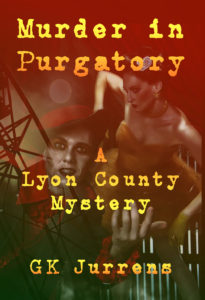
(historical crime fiction)
A gypsy circus visits Lyon County, people start dying, and Sheriff Billy Rhett Kirshaw works with amateur sleuth, Sophie Hardt, to get to the bottom of a mystery that turns out to be a criminal conspiracy.
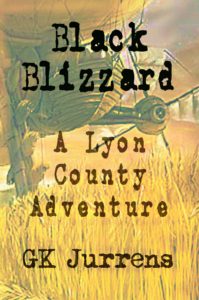
NEW RELEASE 2022!
(historical crime fiction)
Midwestern small-town America battles crime, a spreading poison, and a virulent Mother Nature. Ordinary folk fight it all. Some survive. The unlikely battlefield? Iowa farm country. Available January 2022 (eBook & paperback) with hardcover edition soon thereafter.
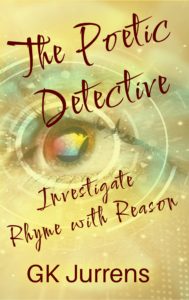
Does poetry interest you, but you just don’t “get it?” Or does it intimidate you? Do you love “word puzzles” and “word paintings” but find them mystifying?
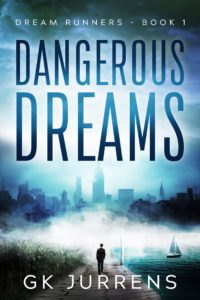
Book 1: Dream Runners Series. Contemporary Business/Political/Military Thriller
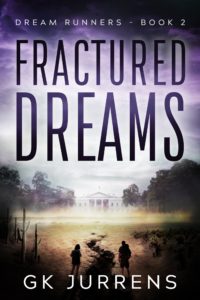
Book 1: Dream Runners Series. Contemporary Business/Political/Military Thriller
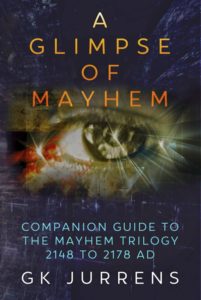
Companion Guide to the Mayhem Trilogy

Book 1: Mayhem Series. Futuristic Thriller/Mystery Series
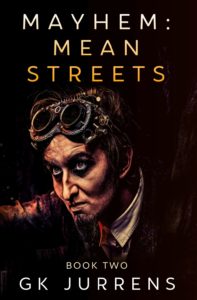
Book 2: Mayhem Series. Futuristic Thriller/Mystery Series
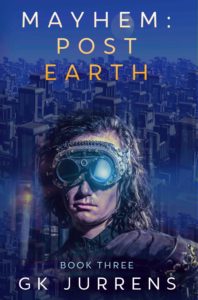
Book 3: Mayhem Series. Futuristic Thriller/Mystery Series
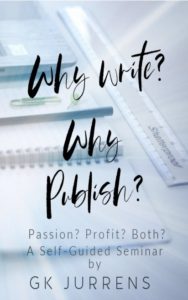
Non-fiction beginner’s or mid-lister’s guide to the craft of writing, editing, formatting, independent publishing and marketing your own work.
4. Sample Interview Qs & As:
(courtesy: Ms. Fiona McVie)
Question: Tell us your name, and what is your age?
Answer: I write under the pen name GK Jurrens, but please call me Gene. My age? That’s not so important, is it? Age yields experience, and inspiration. I’m mature beyond my years, going on thirty-nine. Why thirty-nine? Because I ooze with thirty-something ideas, all the time. And that was a relatively pain-free period of my life.
My thirties were memorable. I was a sky-diver, a scuba-diver but not a dumpster-diver. I’ve been blessed. Since then, I’ve enjoyed back surgery, kayaking, amateur radio, motorcycle touring and voyaging on a sailboat. Admiral Kay and I cruised in an ocean-going sailboat on America’s interior river system, in the Florida Keys, the Eastern Caribbean, the US Pacific Northwest, and the Aegean Sea.
For much of the last ten years, Kay and I have been traveling aboard a 43’ bus-style motor-home, wandering North America, living and loving our waking-state dream. As my body’s age advances, so does my sense of urgency to complete, well, everything.
Question: Where are you from?
Answer: I’ve only lived in the US thus far: in Iowa, Minnesota, California, Texas, New York, Michigan and Florida, which was been our state of residence for twenty years; although, we don’t spend a great deal of time there. We’ve lived in forty+ different states in the US during our years in the bus, for a few weeks to a few months in each place. To be honest, I’ve lost count.
While working my career with IBM, my thousand or so employees lived in a dozen countries and I made it a practice to visit all of them, and to learn a few words of their language, a little of their culture, but I always returned home to America.
I was born in Hull, Iowa. My family lived on a farm until I was six outside of George, Iowa. Then we “moved to town,” not by choice, I’m told. I grew up in Southeastern Minnesota, but I’m not sure where I’m from anymore, other than from this pale blue dot we call Earth. Of that, I am almost certain.
Question: A little about yourself (education, family life, etc.).
Answer: I’m the oldest of my parents’ second litter, with two sisters and a brother (now passed) ten or more years older than me. I believe I was an accident. My mother was forty-two. She bore my younger brother at age forty-five so I wouldn’t be lonely. A stout farm wife (and the basis for the character named Sophie in my latest novel, “Black Blizzard”), my mother was a saint and a sinner, no less, “Daddy.” But they were devout to a fault.
While studying Liberal Arts at a Technical College in Rochester, Minnesota, my teenage wife challenged me to earn a degree that would yield a decent living. Overnight, I switched to Electronics Engineering, then a business major. I then earned a Bachelor of Science degree in Business and a graduate degree in Management of Technology from the University of Minnesota in Minneapolis. That was early during my thirty-two-year detour through the technology industry (IBM). After retiring comfortably at 58 in 2008 (smack-dab in the heart of a world financial crisis, thank you, very much), I returned to a creative path of light and hope. Huzzah!
Question: What is your latest news?
Answer: To date, I’ve published four non-fiction volumes and thirteen novels. But I am particularly proud of a recent manuscript I call “Black Blizzard – A Lyon County Adventure.” Rooted in the historical crime fiction genre, “Black Blizzard” is set in the tempestuous summer of 1933 in and around the small town of George, Iowa, and the Lyon County Seat in Rock Rapids.
My heartfelt objective is to unravel an entertaining yarn while honoring the authenticity of both the area and the period. Some might read this as an extended metaphor, but don’t let that worry you.
“Black Blizzard” has been available worldwide since 2022 (eBook and paperback editions).
I like to say that “Black Blizzard” combines the spirit of John Steinbeck’s classic, “Grapes of Wrath,” and the gut-wrenching characters of Kristin Hannah’s best-selling historical novel, “Four Winds,” but with more action, drama and intriguing plot twists.
5. Sample of 2022 releases:
“Black Blizzard”
(historical crime fiction)
Preface
America trembled through an era of extremes. Millions perished. Not one, but two pandemics swept the globe following the Great War that ended in 1918. On October 29, 1929—Black Tuesday—the free-and-easy Roaring Twenties died a sudden and traumatic death. But the emotional reverberations and illicit vices it spawned did not. Hundreds hurled themselves through skyscraper windows, and tens of thousands across America surrendered their souls to Black Tuesday. Of those who survived its traumatic after-shocks, many drowned their sorrows, but even more were unwilling to do so. Some turned to their faith.
Then the world slipped from bleak to worse. The skies dried up and scorched the earth below. Shadows deepened over the creased land that once offered her keepers bounty for their labor. Farmers took reckless shortcuts hoping to save their acreages. Many could not. Instead of the new decade ushering in new hope, quite the opposite became the new reality.
* * *
The summer of 1931 on the Great Plains of Nebraska and Western Iowa felt like Armageddon. As time stalled, millions of Americans merely subsisted in the clutches of escalating squalor—starving and displaced from their homes. Hundreds of thousands more sought to re-discover Eden—elsewhere. Anywhere else. Those who stayed, struggled for a breath of air free of dust and despair under a drab sky that mocked their foolhardiness. And yes, most stayed put for fear of the sickness.
But even with faces swathed in handkerchiefs, and those lucky enough to own goggles to cover their eyes against the grit, they could not fill the hollow pit where a solid meal and contentment once settled. However, during zero-visibility dust storms they called black blizzards, the larger issue remained—the simple task of breathing more air than dirt.
Banks and private lenders alike gasped for their own survival. They called in notes on homes and farms and businesses that were no longer viable, hoping to turn an economic vacuum into an opportunity for their own survival. Somehow, a few ordinary folk still held money—in land, livestock, inventory, or precious metals. Many more leaned on the only two things of substance left—their faith and their community. Otherwise, the future might be too bleak to contemplate.
This is one such story.
Prey
December 1932
Most birds of prey aren’t large, but their quarry often disagrees. To a field mouse, anything larger than her poses a threat. Yesterday’s brief thaw surrendered to an overnight freeze. The mouse’s tiny nails clicked over the delicate ice crust. Her cheek bulged with a rare grain of winter wheat for her babies who awaited her return in their cozy underground burrow.
The forenoon sun promised a crisp but pleasant morning. A distant screech preceded a quicksilver shadow that cast doubt on the momma mouse’s prospects. The red-tailed hawk swooped in for breakfast. Momma scurried. It was over.
The cycle of life was about to accelerate further, beginning with this otherwise sleepy morning in the rolling plains of northwest Iowa. The hawk, with breakfast in her talons for her own young, contemplated landing near the top of a power pole alongside Lyon County 14. But she thought better of it as she dodged a speeding motorcar slicing through the bitter wind. The auto swirled up a vortex of new snow in its wake, a feathery dusting that refused to stick after last night’s freeze.
* * *
The driver swelled with pride at the chromium hood ornament of a leaping hound on the far end of his motorcar’s sleek hood. It wasn’t just that handsome marquis, but what it represented: prestige and respect. The brand-new auto had been a Christmas gift from Mr. Finn Malone of Chicago, Illinois. Her ultra-modern coachwork concealed her road-proven four-cylinder power plant. There were just too many stylish innovations to count over her predecessor, the Model A. Important folks drove cars like this.
The musky smell of tanned cowhide—and this kid’s breath—filled the car’s interior. No surprise, with those teeth. He did wonder what that was all about. Seemed out of place with those snappy duds. Big city types. Immigrants, no less! With a brilliant but hazy sun off to his left, the driver risked a glance at the big-city passenger to his right. The serene fellow with scary undercurrents gave him the creeps. Especially that lop-sided smirk, his brown teeth, and those eyes. He could still spot traces of blood around the edges of the kid’s fingernails. And who in hell wore a black shirt with white buttons, anyway?
He’d met guys like this before in his line of work—thankfully, not often. More so these days. Short, but larger than life, he was Irish, not German like most folks around these parts. Sounded like a Mick too. Close-cropped ginger hair sprouted from beneath a flat-topped skimmer that shaded his youthful brow. Not very practical. Too damn cold for a straw hat. That overcoat he called his Crombie—whatever that meant—just had to cost a bundle. Slickers! Regardless, with the grim task at hand, the driver struggled to bury the charred-black corner of his conscience.
The scary little gunsel they called Sticks Leary worked for Mr. Malone. That meant he was to be respected—on the surface, anyway—and not just because this kid was a shooter. Malone commanded, the world obeyed, and not just in the Windy City.
As Leary thumbed loose two huge buttons of his Crombie and flipped down its generous collar, the driver caught a metallic flash. A shiny pistol nestled under the kid’s right armpit in a fancy shoulder holster. A show piece. So, he’s a southpaw. Leary shrugged the coat forward with a jerk on both lapels. The cannon disappeared as the huge collar lay down, revealing the rangy kid’s neck and a purplish circle beneath his jawbone. A puckered scar from a bullet wound to the left side of his scrawny throat. No, despite his youthful appearance, Leary was no kid.
He rolled his bug-eyes up to gaze at the driver in the rearview mirror. “Just watch the road, boy-o. Wouldn’t do to put this pretty new sedan into the ditch, now would it?”
“Right. So, Mr. Leary, just curious. Who’s under the blanket in the back?”
“It’s just Sticks, ‘kay?” Why did Just Sticks’ smile not warm him up? “Don’t ya be worryin’ ‘bout any a that just now.”
The driver already knew who was under that blanket, but he didn’t know why. Not that it mattered, other than worrying about the stink of the recently deceased. He’d been beckoned after the deed was done. Leary and another guy had loaded that cargo of dead weight before they allowed him back into his own brand new car. Leary had laughed, “Some jobs ya do yerself, yeh?” And there had been that spooky smirk with those jagged chompers and a cheerful glint in those crazy bug-eyes. Well, in for a penny….
The small Irishman, like a hellish leprechaun, continued with conversation meant to sound congenial, as if warming up to a recruit. He obviously enjoyed the sound of his own clipped voice dripping in that ridiculous brogue. Again, with the unconvincing smile. Or was he flirting with a leer?
The gunsel said, “I see why Finn likes the lay a the land out here. Borin’ with a big “B” as far as the eye can see, yeh, boy-o?”
“If he’s looking for rural isolation and no G-Men within a hundred miles, yep, this area should suit his needs.”
They were only to drive a short distance south of George on Lyon County 14. Hopefully, this would be a brief conversation. The kid turned toward the driver, swiveling his left knee up onto the seat between them and slinging his left arm behind the driver’s shoulder. The frontal assault from the kid’s maw damn-near gagged him. “Tell me ‘bout this dealership. Why should Finn get into this at all?”
He’d already explained this to Mr. Malone up in Worthington. With more obligatory deference than genuine sarcasm, he addressed the odious little creep. “Well, George, Iowa is a sleepy little town of about a thousand folks. Mostly farmers who’ve moved to town after making their bucks, or they just got too old to work the land. There’s money there. But they’re mostly poor folks getting by—especially these days. No local law enforcement. Only up in Rock Rapids, the county seat over ten miles northwest as the crow flies, and almost twice that by motorcar. Bairns Motors, the only dealership in George, buys respectability with a low profile. And they have a lot of square footage under roof. It’s the perfect front. Plus, all the well-to-do farmers from the surrounding area buy their Chevies from Henry Bairns. It’s a legitimate business, at least according to our expert consultant—our mutual friend.”
Leary pasted a smug look on his face as he stretched thin leather gloves over his bony fingers. “Finn tells me yer a good soldier, and yer regular. That’s worth somethin’.”
An arrogant little prick, this Mick. The gunsel swiveled a practiced three-sixty with his dark bug-eyes showing lots of white. First ahead, then over his left shoulder, and the same over his right, shifting in his seat as he did so. There was that cannon again. Pausing, Leary didn’t look the driver in the eye, only at his gloved hands on the wheel. “Pull over. Right here. Ya hang tight while I take out the trash.” Dead serious.
The driver jerked the wheel. The car swerved to the edge of the road with two tires in stiff ditch weed. The tires crunched. He ground the gears before he settled the floor shifter into its sweet spot. He squeezed, then pulled the ratcheting brake handle with his left hand. The car skidded to a stop.
Leary slid out of the passenger’s side, but stumbled in his city oxfords on the snowy weeds at the precipice of the shallow ditch. He’d have fallen without his chokehold on the handle inside of the still-open front door. Grabbed the rear door’s exterior handle with his left hand, swung it open and back. The driver stole a glance at the passenger-side fender mirror. Partially blocked by the open door, he still saw Leary tugging his cargo from under the wool blanket and dragging it into the ditch. The blanket stayed on the floor behind the front seat.
With the task complete and his legs still dangling out of the door, Leary kicked his heels together. Jettisoned wet snow that clung to his warm shoes before swinging his legs back into the car. He tossed a small but heavy trophy from the kill into the driver’s lap. “A keepsake fer yeh. Let’s go.” Flat voice, no emotion. But when he caught the driver looking at him, he offered another one of those tiny foul-mouthed smirks—the left corner of his mouth higher and more puckered than the right. The driver stared down at the wet and cool Lyon County Deputy badge he now held in his right hand—scratched and dented. Retrieving a silk hanky, Leary polished his shoes. “What say you show me this town with the funny name, ‘kay, Sheriff?”
Strictly speaking, dumping murdered deputies was not part of his job description as Sheriff.
What have I gotten myself into?
To get your copy, click here.
Murder in Purgatory
(historical crime fiction)
Chapter 1
Wednesday
April 4, 1934
South of George, Iowa
* * *
Lyon County Sheriff Billy Rhett Kershaw drilled himself for the millionth time. How in tarnation can I have both nightmares and insomnia at the same time? He had not slept well for a single night in the last sixteen years.
As he pursued an erratic driver down Lyon County Route 14, the vivid image of his murdered deputy last year—bloodied and disrobed—haunted him. Without warning. Again. Plain as day, in his mind’s eye, he visualized the almost-unrecognizable, nearly naked corpse of Deputy Roddy Braddock found last summer on this very stretch of dusty road. Nor could he purge the memory—or the feeling—of twenty-year-old Roddy’s pregnant wife beating on his chest with both of her tiny fists. He remembered her fury when he delivered the news of the kid’s murder. Worst part of the job, right there. I can still feel those little hands hammerin’ on me.
A foot-deep rut tried to hurl him off the road. A new rattle clattered underneath his police cruiser and interrupted his waking nightmare. The new sound and vibration wasn’t all that obvious, but he feared a mechanical failure, one of a whole collection of fears. Strange for a guy everybody thinks is fearless. If they only knew.
Billy vaguely noticed the landscape flying by in a blur. The last dad-gum thing I need right now is a broken axle or snapped leaf spring.
He needed to stop the careening truck, still two hundred yards ahead of him. This idiot’s gonna kill somebody, maybe himself. Why does everything happen in this part of the county?
Not only was this where they found Roddy’s body, he and some deputized citizens battled a bunch of brutal mobsters on Chief Dan’s farm last year, five miles south. Deputized citizens… now the best friends I got.
Billy took some small comfort that the fancy flashing light on his left fender and that troublesome siren on the other side both worked today. New-fangled contraptions decide for themselves when they wanna work. But I sure don’t need no farm truck jumpin’ out of a blind field road about now.
This battle-hardened police cruiser, though only two years old, had already been through more than older cop cars. Big and little dents, several bullet holes, and a few scorch marks remained from that altercation during last summer’s monster black blizzard. Yup, that was one helluva storm, in more ways than one. He secretly admitted those “decorations” added a certain… authenticity to his cruiser, and to his boring job profile in otherwise sleepy Lyon County.
He wasn’t only an elected official. He and his deputies cleaned up last June by kicking that bunch of big-city bootleggers from out east right straight through the gates of Hell. Served ‘em right. And with the election coming up in November, a few reminders couldn’t hurt.
Billy surprised himself at how much he wanted folks to re-elect him. Being sheriff was more than a job he’d settled into. There ain’t a helluva lot else, with Alice gone ’n all. He’d lost his young wife to the Spanish influenza sixteen years ago last month.
Right now, though, he’d better to focus on his driving. The steering wheel jerked with brutal resolve under his two-fisted grip as the front tires and wheels reacted to the punishing ruts and bumps. The half-frozen ground of this notorious roadway offered no lenience—none at all.
He didn’t recognize the old stake-side truck ahead of him. Now why in thee hell would some stranger be racing through my county at breakneck speeds? What don’t I know here? No crimes reported. But since when were criminals known for their logic? Maybe he ain’t no criminal. But speeders who fled lawful pursuit, while rare, were law breakers, and such opportunities gave Billy a sense of official purpose. Truth be told, his job was downright boring most of the time. Now he worried whether the county budget could afford costly mechanical repairs to his cruiser – one-third of their “new” law enforcement fleet.
But he could not let this law breaker escape. Despite the dry freeze on the ground, the idiot’s truck disappeared now and then into a dust cloud as he kicked up powdery road dirt. Made Billy more than a little nervous whenever he drove into one of those clouds without much idea what he was heading into.
To say the fleeing truck was operating in a crazy manner didn’t do justice to what Billy was able to see ahead of him. Fool must be drunk! And as if to prove his theory, the driver’s front-end dived into a rut that threw him into the west-side ditch. Kicked up dead grass, dirt clods and chunks of debris behind him. Some were parts from his truck. Not a deep ditch, but it was deep enough to roll the truck over twice. No, almost three times, at a blazing fifty miles-an-hour, before it settled onto its driver’s side in the adjacent field.
As Billy slowed—he didn’t need to brake much as the rough road clawed down his speed on its own—he wrestled the wheel to his right. His two passenger-side wheels descended into the shoulder-slash-ditch. Now, steam rolled out from under his hood. Must a popped a hose. At least I caught this sumbitch. His siren took its time winding down. He stepped out of his cruiser and surveyed the scene with deliberation. Just like his deputy, Dwight Spooner, taught him.
The truck had tossed its driver clear. Billy spotted him ten yards away from the truck at the edge of the field. No doubt he’d been thrown out during one of the initial rolls as the truck was farther away from the road. Billy wore his holster low on his right hip with a leather lanyard that secured its bottom to his thigh. Like the pictures he’d seen of Old West lawmen. Not taking any chances, he unsnapped his revolver’s retaining loop over its hammer as he approached the driver. Confirmed he was nobody he knew. Scruffy-lookin’ fella, aint’cha? He had come to rest on his back with one arm bent way back and underneath him—obviously snapped up near the shoulder socket.
Unconscious and unresponsive, lots of blood had already flowed down into his already matted hair. More blood from the center of his forehead had dribbled into his eyes and down onto both temples. He had left the truck through the windshield.
Must a snagged his carotid based on the pool of blood that’s drainin’ from that gash on the side of his neck. Ain’t pumpin’ or spurtin’, though. Billy’d bet a whole dollar at that point there’d be no pulse.
Could be the old boy hit one of these rocks after the truck tossed him out, too. And something had punctured his left eyeball—looked like its juice leaked out and left it sagging. His other eyeball? All blood-red. Jeez, mister. Tore you up some, for sure.
First things first. Standing at the fellow’s side, Billy nudged his foot with his own boot. Nothing. Kneeled down. No pulse. Yup, darn fool got himself killed, alright. Damn.
He relaxed a little. Checked all the pockets for identification. Nothing but a tin of chaw with a sticker on the back from Boy’s Town General Store. The old boy’s shirt was torn and had ridden up. Billy spotted a small but strange tattoo—and only one, as far as he could tell—below his belt line and on his right hip: ♍︎. He was no fan of tattoos.
And that’s when a whole lot of nasty body odor assaulted him. He reeled on his haunches from bowels and bladder set free of the gift of life, as they say. Cripe sake, mister, ever take a bath?
The old boy’s fingers looked busted up, all gnarled. Could be what they call arthritis, or more likely, old breaks. Or both. Then Billy saw the ring—just one ring. Looked like a wedding ring, but it had been biting into that old boy’s finger for a long time. He clearly never took it off. Looked like the only way to get it off now was with a hacksaw.A dull gray thing, ugly, with a slight gold tint, like maybe it was valuable once, or still was if cleaned up and polished. He lifted the old man’s gnarled hand just enough to get a closer look. The tiny engravings around the ring’s main feature—a bony skull—were too worn to make out. What in thee hell? What’s your story, old son, and what in Sam Hill are you doin’ tearin’ around God’s green acre like a lunatic?
Billy wrinkled his nose and drew in a sharp breath through his clenched teeth as his knees creaked when he stood. He imagined a thousand possibilities as he shoved back the brim of his favorite black Stetson to scratch his forehead. Fingertips came away greasy.
After staring at the corpse for a good long while, wondering, he noted the time in his ever-present pocket notebook with a stubby little pencil. Half-past eleven in the AM. Jotted down notes on the body’s position, a sketch of the unusual tattoo, and the locations of the victim’s visible wounds. He scratched out another sketch of the ring, listed the chewing tobacco can, its sticker, even wrote a note on the nature of the old duffer’s rank odors.
But Billy registered surprise that he didn’t find any evidence of alcohol consumption given his erratic driving. He also noted the truck’s location relative to the body. Not a bad crime scene diagram, cowboy. Too bad this one includes a body. He immediately scolded himself for being insensitive. That passed.
Based on his proximity to Silas Hummel’s farm, he knew he was about four miles south of George on 14, west side. Recorded it all according to the procedures he and Dwight established last Fall. Those procedures were based on his deputy’s experience as a homicide detective with the Minneapolis Police Department before the war.
Billy turned away from the corpse and approached the overturned truck in the fallow field. Half-frozen weeds crunched underfoot. That didn’t stop dust tendrils from escaping up around his ankles. Cripes, it’s dry.
He stopped, watched the clouds of vapor from his breath rise straight up—almost no wind. Another note. Steam rose from the truck too, still resting on its driver’s side with the radiator pointing back toward the road, like that’s where it wanted to be. Stunk of gasoline, but no smoke or flames.
As he got closer and walked all the way around the wreck to get a general sense, Billy noticed some peculiar things. He’d learn more after one of the mechanics from Bairns Motors in George gave her a good once-over. No license plates, front or rear. No registration tag on the steering column. Some blood there, and on the wheel. All the bed’s stake sides were busted off, scattered closer to the road. But bits of straw and smears of manure clung to cracks and gaps between the warped planks that made up the truck’s bed, which was now more vertical than horizontal. Like a farm truck. But this shit don’t stink like any hog or cattle or horse or even turkey dung I ever smelled before. This was different.
Plus, he spotted some greasy white stuff smeared here and there on the truck’s bed.
Before he wrote down those tidbits, he scratched the back of his chilly neck. Shoulda worn a jacket and a scarf.
Somethin’ about this whole deal stinks to high Heaven. Billy wrinkled his nose at the strange stench of this many unanswered questions.
What in thee hell?
Chapter 2
Thursday
April 5, 1934
Rock Rapids, Iowa
* * *
Sheriff Billy made a few phone calls from his desk at the Law Enforcement Center. No crimes had been reported nor any trucks stolen. But then, at that moment, everything stopped. Outside of him, anyway. Inside, it all raged.
Mid-afternoon doldrums clawed at Billy’s conscience the worst. Especially days like today. He sat frozen in an endless time loop—sixteen years ago. He battled memories of his dead brothers-in-arms killed by the enemy, but especially every kid he slaughtered with his own hands. Those memories squeezed him, every hour of every day, but right now, more than usual. Each bloody accident or crime scene made them worse. Why did Dwight and I survive and they all died? How can I live with that?
Every single face—their empty eyes, their mouths hung open in… surprise… at that, their final moment. Because of him. Each remained etched behind his own eyelids, seared into his nightmares—awake and asleep. Like a branding iron burns into hair and flesh on the rump of a steer.
The endless images of their shredded bodies rushed him, coupled with the stench of their rot from too long left in the mud. The agony of their silent screams. And the fresh ones—that coppery smell of wet meat… and those expressions of… surprise.
Billy relived these endless moments in full color, full motion, and three dimensions. On top of all that, the remembered stench and the screams drove him to distraction. But the non-stop ringing pounded in his ears. Like now. All part of God’s reminder: thou shalt not kill.
Sometimes that deafening ringing stung him worse than anything else. No doubt from a week of non-stop artillery barrages raining down on them in the Argonne Forest. He even got a tattoo, of sorts, from an up-close powder burn in front of his left ear, thanks to a Mauser Gewehr 98 rifle’s muzzle. He felt that sixteen-year-old stippling—courtesy of a teen-age Nazi—with his index finger. Everything that he still heard in that ear now came to him thick, like through a pillow.
On days like today, he drowned in images of hundreds of German troops and bayonets and eyes dying, inches away—some innocent like he used to be, some murderous. We did what we had to do, didn’t we, cowboy? We survived. Me and Dwight. But all the rest? I’m a good cop, if nothin’ else. Gonna find out what happened to that old boy in the truck, aren’t we? Yessir, I can do this.
A haze of dust motes hung in the silent squad room around him in the LEC that fronted on Main Street. Calling it a squad room was a hilarious euphemism. The entire two-room LEC looked more like a medium-size general store with knee-to-ceiling glass facing Main.
Four desks, a couple of bolt-in holding cells in the back, along with a glassed-in office next to the cells for private stuff, which is also where their part-time science guy worked. Old Doc Gustavsen was also the county’s as-needed medical guy—general practitioner, coroner, cheerleader on tough cases, whatever. He wasn’t around much. Doc Gus also worked the emergency room at the hospital in Spencer.
Lyon County did just fine with a sheriff and two deputies. Most days. Young Jimmy Lenert loved cruising. He’d drive around the county looking for trouble. Dwight Spooner, however, was Billy’s age, with similar mileage. His time at the Minneapolis Police Department Metro Division as a decorated detective ended with the war.
After Dwight returned from France in 1918, he shared Billy’s nightmare-induced insomnia. They’d both earned their sleeplessness clawing their way into and out of the same bloody fox holes—hundreds of them—in and around the Argonne. After France, Dwight left MPD for unspecified reasons to become a beat cop in the small city of Worthington, Minnesota, for fifteen years.
Then last summer, Billy asked his friend for help with some mobbed-up bootleggers that had invaded Lyon County. Dwight would never refuse a brother-in-arms. He came to work for Billy, who now looked up with just his eyes.
He’d been at his desk all night. It showed. Morning already? Shit. Saw Dwight coming through the front door and thought, Ole Deputy Dawg’s runnin’ from somethin’. Poor guy.
The Poetic Detective
(historical crime fiction)
Becoming a Poetic Detective
What makes no sense Can make no cents. So, let us dispense With talk of expense And find new joy Inside a new toy.
***
Why the Poetic Detective?
Hey!
I don’t enjoy watching basketball, maybe because I don’t understand the game. The same is likely true for most reluctant readers of poetry.
So while I think my poetry is good, I might help you enjoy it and all poetry with more profound enjoyment by simply revealing to the naked eye its subtle but shapely curves, to strip away the pretense, exposing its sinewy flesh and muscle and flexibility in all its glory—to reveal all its secrets and to leave you satisfied.1 (see note #1 at the end of this chapter).
If you are an aspiring poet, you will find this guide insightful and educational, possibly even amusing.
Our goal—yours and mine? To read and enjoy poetry with an informed eye.
Like most poems, the chapters in this book are short and packed with information in a straightforward and unpretentious manner. But you must think. That’s not so bad, is it?
I’ve studied and condensed key learning points from dozens of revered texts on the topics of reading and writing fine poetry. I found most of these wonderful resources too expansive to absorb for the average and impatient reader, including me. At first, I struggled. Then, after months of effort, it came more easily. I’d like to spare you that trauma.
If you’re an aspiring critic or an analytical reader who hungers for more knowledge, but don’t wish to spend hundreds of hours to acquire it, you too should find this guide a concise and useful exposé.
You will then know when I and other poets break the rules. And you’ll learn soon enough I am an irreverent rule breaker. But then you decide for yourself when that works, and when it does not.
Case in point: consider the title of this book, “The Poetic Detective.” Greater linguistic precision would have been served by titling it, “The Poetry Detective,” but how awful does that sound? You’ll learn why my chosen title—and the book’s theme—make more sense shortly. I broke a rule for the sake of “artistic license.” Yeah, I am such an outlaw!
If you are already an accomplished poet, you might find some new ideas you can press into service. At the very least, I’m hoping this will stimulate you.
Why should you bother with this book? And who am I to suggest I can offer you a flavor of verse 2 (see note #2 at the end of this chapter) along with a method of reading it that you might even find compelling?
Is it possible you don’t really care for poetry? Yet? If that’s true, good! I hope to change that.
Said differently, I hope to change or intensify your attitude toward poetry by exposing the poet’s perspective when composing a piece. You’ll then use this knowledge to enjoy any poetry more.
So what is useful or even interesting about this book? It might just compel you to experience all poetry with fresh eyes. But it will accomplish this in a lean ’n mean fashion. I promise.
While I consider myself a creative, right-hemisphere-dominant—I’m even left-handed—I bring with me the discipline from a career in global technology. That is to say, I love attention to detail as much as I enjoy impulsively pursuing anything and everything of intense interest this life has to offer. Plus, having worked and visited my employees in more than a dozen countries, I have some interesting yarns to spin.
For example, I choose each word with ridiculous care. Being both obsessive and irreverent helps, not to mention conflicted, maybe like most creatives.
That is a good thing for an author, and especially for a poet, sufficient to craft an exciting picture in the minds of our readers. But poets accomplish this with some specialized knowledge and the careful selection of a few words instead of being encumbered by paint or a camera. We then use our minds, the poet’s brush, as we read the works of other authors and poets, attempting to see into their vision. Mr. Spock might call that a mind-meld.
Poems often come from a place that might fascinate you, but you’re probably glad you don’t live there yourself.
This is where we wish to journey. You will see I’m having some fun with typographical shape next, with nary a rhyme or rhythm structure to be found. Just let the line breaks work for you.
Come play with me:
Read a poem. Twice. Now paint the rest of the picture within each poem.
Paint it from within your own fertile imagination— with warm or frigid hues, maybe some over-saturated colors, or harsh black on white.
Maybe paint the poem’s picture in your mind’s eye with some broad strokes— a rough outlaw texture,
or with latte-smooth spirituality reminiscent of a few paintings that force your heart to pound blood in your temples a little harder. The entire effect might just pump your own pulse a beat or three faster… more food for a bold brain who hungers.
Is what you just read poetry? Who cares! Read this book to find out if you should. What do you have to lose? How about investing a few hours with me to just indulge, maybe spread over a day or two, a week or three? Aren’t you willing to take a chance to enrich your already sophisticated self?
Meander with me through an offbeat buffet designed for consumption in provocative and digestible bite-size chunks. Perhaps before you drift off into your own dreamscape each night? Or in front of a cozy fire with a blue-white snowscape just outside your window at twilight. Or with an icy drink by the heated pool?
The nascent detective in you will rest easier knowing you have “solved” a poem better than ninety-nine percent of poetry readers on the planet because you have a need to know! Having read this book, you will know. You must be curious.
Let’s find out how much, together.
1 While not strictly a poetic expression, you may or may not appreciate my one and only anemic attempt in this volume at an amusing double entendre—a word or expression capable of two interpretations with one usually risqué.
2 Words and phrases from the lexicon—language—of poetry are italicized throughout this bookfor easy identification, as are complete poems and quoted lines of poetry.
***
Making Sense of Poetry
Let’s take a look at where we’re headed.
Part One of this book, a primer, offers you a fresh way to think about all poetry, maybe even a different way to make more sense of the beauty of all poetry.
Part Two of this book offers you a selection of my own poetry, correlating each brief composition back to the principles from Part One. I promise your experience with my poems, or works of other poets, will make a great deal more sense, and will enable a more enjoyable read.
Are you ready to become a poetic detective? Sleuth on, my new friend!
For the motivated reader, poetry does not need to be difficult or mystifying. In fact, it can and should be pure pleasure, a puzzle for the thoughtful mind that should also paint a fascinating picture behind your eyes. But like all art or literature, there will be poetry you love, and some you’ll hate. That’s fine. I hope you read and love at least some of mine. Some, you won’t, I promise. That’s how this works.
But just like watching a sporting event, or enjoying a classic painting, or solving a mystery, the more you understand the rules, the terminology, and conventions, the more enjoyable it will be. And the more capable you become. You immerse yourself in the game, or the painting, or the mystery, or the poem. You nurture a more meaningful relationship between you and the world around you, and especially with that poet.
As a reader, art lover, poet, or critic, it can also be fulfilling to know when rules or conventions are bent or broken by an expert hand for marvelous effect. Or by a rookie who writes tripe. Don’t you think? But first, you need to learn—or be reminded of—those conventions. Then, detect away!
Do you want to feel like an insider? Or are you already an insider and wish to take your immersion experience to a different level?
Nothing clarifies better than examples, so I’ll leverage several in this tight volume, including a classic, as well as some of my own poems, to illustrate and reinforce key points.
By the end of this short book composed of short chapters packed with principles and examples of poetry, you will not have become a black-belt expert at reading and critiquing poetry, but you will be a knowledgeable and capable poetic detective!
Note that all the terms used in the language of poetry will be italicized for easy recognition. I’ll remind you of this periodically. Here we go.
***
What is a Poet?
* * *
Poets are unique.
I spent forty years compiling this book.
How’s that for unique?
Definitely not a fast moving virus
or a lust for commercial success.
Is it?
Others argue poets are afflicted by an emotional disease, a disease of the heart. But I am convinced the situation isn’t so complex for this particular poet. I just love fitting words together in ways that clever readers appreciate, while burying “secret messages” that only a clever reader can discern. And you are clever, or you would not be here.
This poet, at least, falls prey to a propensity for getting into literary trouble. Writing well is hard. Writing poetry well is harder. But that’s not enough, is it?
The best poets wish to complicate matters. I know—perverse. They exercise their talent to make their creative venture more technical—for themselves. However, at the same time, the good ones strive to craft a more enjoyable and non-technical experience for their readers.
The great poet, Dylan Thomas, remains one of my heroes. While I am humbled as I read and study his work, I’m egoistic enough to believe he and I are, at least in some tiny way, kindred.
Not only does Thomas write well, he is a genius of rhythm, rhyme, structure, metaphor, alliteration, assonance, consonance, tone, mood, pacing, theme and unity 1 (see note #1 at the end of this chapter).
In a moment, you will discover more about all of these simple and interesting terms comprising what I call the sexy anatomy of poetry in the coming short chapters.
If you are in any way intimidated by reading poetry, I suggest this book is exactly what you need to read so you can then relax and enjoy reading any poetry.
For now, however, don’t worry about all these fancy terms. But do not miss out on the masterpiece below.
* * *
Have you experienced “Do Not Go Gently Into That Good Night?” by the Welsh poet, Dylan Thomas? If not, I can almost guarantee you’ve heard at least one or two of this classic’s lines that are often quoted.
Thomas manages to embed intricate poetic complexity in his work while making its architecture just disappear behind a veil of simple eloquence.
Genius.
I love this verse, not only because of its iconic place of high honor in literature, but because Thomas crafted this haunting elegy—a tribute to his dead father—within an elegant framework, but without burdening the reader with the complexity of that framework.
Entire essays explore the deeper meanings of this short nineteen-line classic, but you need not read them to enjoy the simple sound and rhythm and imagery you see below.
After you finish reading this book, you’ll delight in applying your newfound poetic detective skills to squeeze more juice out of this classic, as well as all the poetry you might choose to explore or investigate.
For example, did you know this poem is written in a style called a villanelle? Invented by the French, they have mastered making simple things complex. But don’t worry! This poem doesn’t need to be a puzzling word painting, unless that sort of thing floats your boat (yep, we’ll cover mixed metaphors later).
Not only is Dylan’s verse profound and elegant, he meets the following precise technical requirements that define a villanelle without their seeming technical to the reader. Only review these bullets if you delight in riveting trivia (these are also clues), or if you lust for your promotion to poetic detective:
- Six stanzas (verses) of five triplets (3-line stanzas) plus a final quatrain (a 4-line stanza),
- There can only be two rhymes throughout (a-b-a, a-b-a, a-b-a…), which means the 1st and 3rd lines of each stanza rhyme with each other, and the 2nd lines of all stanzas rhyme with each other, but none other,
- The poet repeats the 1st and 3rd lines in their entirety a total of three more times each, as refrains (repeats), according to the following pattern:
- Line 1 appears again as lines 6, 12, & 18,
- Line 3 shows up again as lines 9, 15, & 19.
Now I ask you. How uniquely elegant—and beastly perverse—is this? It does present a wonderful word puzzle to delight every clever and mentally obsessed reader. The most fascinating two facts at this point are:
- This isn’t the most complex poetic structure, by far, and,
- Thomas pulls off this proud elegy to his dead father beautifully.
See for yourself.
Do Not Go Gently Into That Good Night by Dylan Thomas (written in 1947, published in 1951) Do not go gently into that good night, Old age should burn and rave at close of day, Rage, rage against the dying of the light. Though wise men at their end know dark is right, Because their words had forked no lightning they Do not go gently into that good night, Good men, the last wave by, crying how bright Their frail deeds might have danced in a green bay, Rage, rage against the dying of the light. With men who caught and sang the sun in flight, And learn, too late, they grieved it on its way, Do not go gently into that good night, Grave men, near death, who see with blinding sight Blind eyes could blaze like meteors and be gay, Rage, rage against the dying of the light. And you say, my father, there on the sad height, Curse, bless, me now with your fierce tears, I pray, Do not go gently into that good night, Rage, rage against the dying of the light.
This singular genius has left his brilliant mark on history for your pleasure and mine. Thank you, Dylan!
I too have a message. Hear me roar. Read the rest of this book, if you dare. I promise to foment an adventurous journey.
Let’s get started!
6. Testimonials:
From “Black Blizzard‘s” pre-publication (beta) readers):
- “I had to stay up way past my bedtime last night to finish the book… because I wanted to find out how the story ends. The book is quite gripping, not just because the characters are so relatable and likable, but because you inject a story line with believable tension. Having lived in Iowa and gotten to know many students from farm families, I felt at home with the Iowa people.“
- “I just finished your book. Thought it was excellent.“
- “I’m impressed by your writing.“
- “A great job of tying subparts of the story together. Bravo!”
- “One word: authentic.”
- “The ending was very satisfying.“
From “Murder in Purgatory’s” pre-publication (beta) readers):
- “Fabulous!”
- “You sure know how to keep a reader in suspense.”
- “I just loved Sophie, Sister, Babbo, the sheriff. The characters are endearing and so real.”
7. Promotional Images
for new releases:
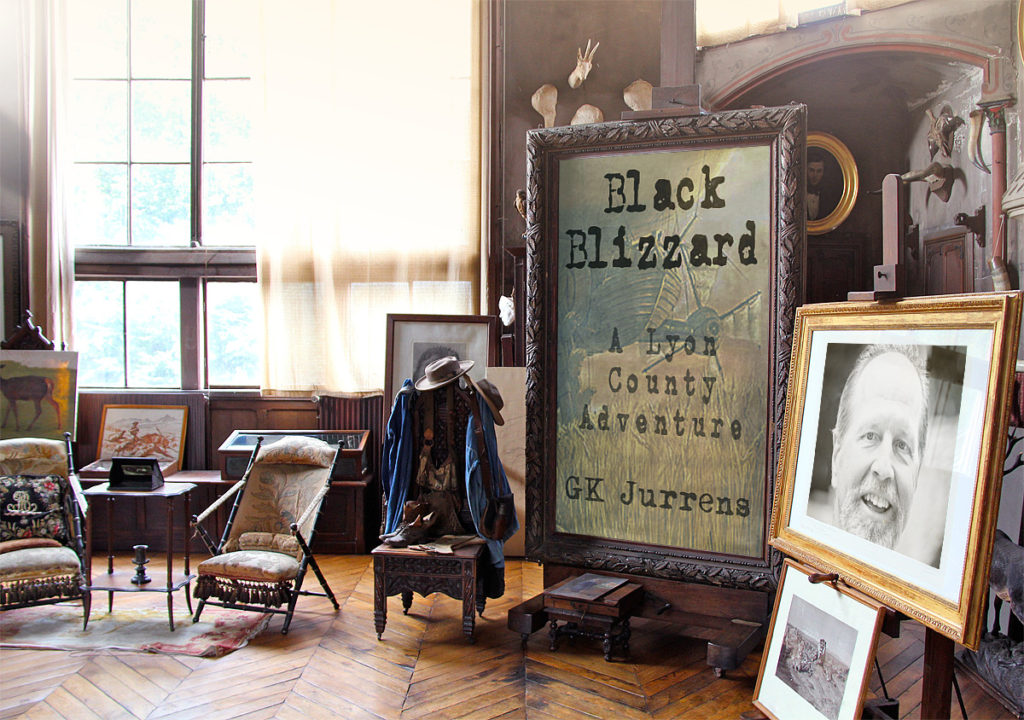
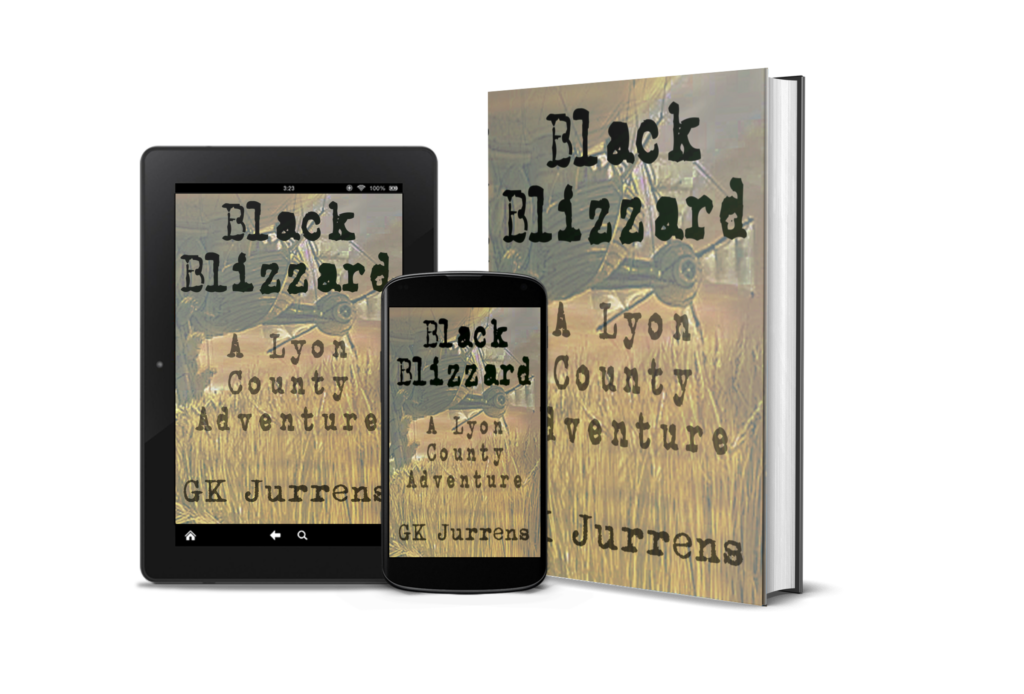
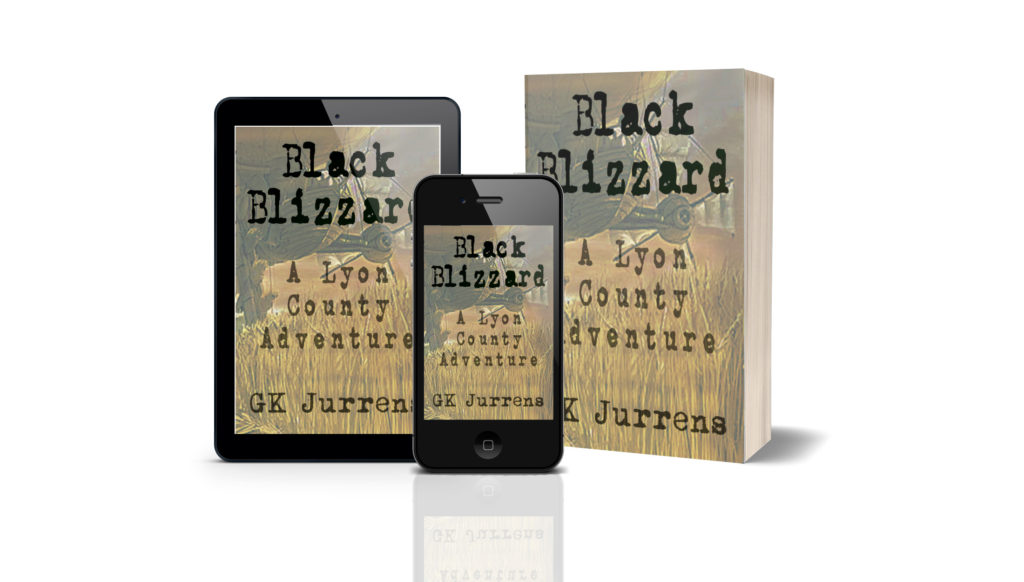





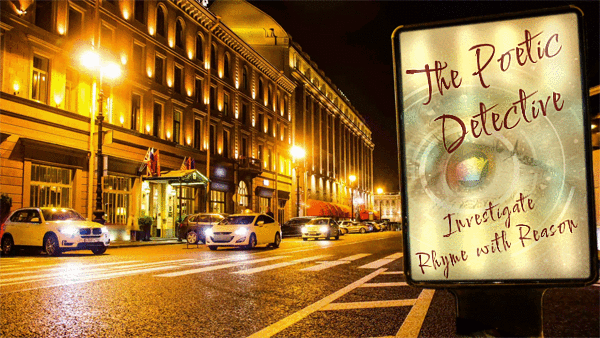


8. Other Media:
- Book trailer: Dangerous Dreams (debut novel – psychological thriller)
- Writing Fiction Daily Newsletter on Twitter
- Indoor Skydiving (general research and thrill junkie)
- Researching “Murder in Purgatory”
- Researching “Fractured Dreams”
- RV Website: BigRigRoads.wordpress.com
9. Members of the literary community, media & book reviewers:
Please contact Gene at gjurrens@yahoo.com (preferred)
or by phone (507-254-8480):
- Name of your organization, firm or publication,
- Contact name and phone number (direct extension, please),
- Location, circulation & coverage (number of customers, geography)
- Theme & type of readership (general news, literary (fiction, nonfiction), demographics (urban, suburban, rural), specialty…),
- Services offered (library services, publicity, book reviews…),
- Type of request (interview via email, phone, Zoom, personal appearance, book review…)?
We look forward to hearing from you. Thank you!
GK (a.k.a. Gene) Jurrens & UpLife Press

